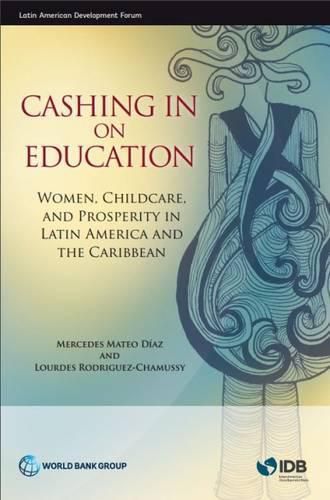Readings Newsletter
Become a Readings Member to make your shopping experience even easier.
Sign in or sign up for free!
You’re not far away from qualifying for FREE standard shipping within Australia
You’ve qualified for FREE standard shipping within Australia
The cart is loading…






Investments in education across countries in Latin America and the Caribbean have transformed the lives of millions of girls and the prospects of their families and societies. Unleashing the full economic potential of women is nevertheless still a curtailed issue in the region: just about half of women are unable to participate in paid work. The majority of the population out of the labour market is women between the ages of 24 and 45. This is the largest share of the available pool of unused human capital countries have, and where mothers of young children are concentrated. This book argues that more and better childcare constitutes a fundamental policy option to improve female outcomes in the labour market, but countries need to pay particular attention to the design and features of such services. First-rate educational programs will be useless if children are not enrolled or do not attend formal education centers. A large program expansion will be wasted if parents cannot enroll their children because they are unable to reach the center, don’t trust its quality, if the program is too expensive, or if work and care schedules are not compatible. Through an integrated framework applied to each country and an overview of the existing evidence, this book addresses the why and what questions about policy relevant instruments to achieve female labour participation. Parts I and II of the book lay out the motivation for Latin-American and Caribbean countries to act depicting their current situation both in terms of women’s labor participation and the use and provision of childcare services. Moreover, this book tackles the how question contributing to the incipient evidence about factors affecting the take-up of programs and demand for childcare services and other informal care arrangements. Part III of the book explores how to improve services and implement more and better formal, center-based care arrangements for young children. It looks at international benchmarks, discusses different experiences and proposes specific actions to solve potential inequalities in access to childcare.
$9.00 standard shipping within Australia
FREE standard shipping within Australia for orders over $100.00
Express & International shipping calculated at checkout
Investments in education across countries in Latin America and the Caribbean have transformed the lives of millions of girls and the prospects of their families and societies. Unleashing the full economic potential of women is nevertheless still a curtailed issue in the region: just about half of women are unable to participate in paid work. The majority of the population out of the labour market is women between the ages of 24 and 45. This is the largest share of the available pool of unused human capital countries have, and where mothers of young children are concentrated. This book argues that more and better childcare constitutes a fundamental policy option to improve female outcomes in the labour market, but countries need to pay particular attention to the design and features of such services. First-rate educational programs will be useless if children are not enrolled or do not attend formal education centers. A large program expansion will be wasted if parents cannot enroll their children because they are unable to reach the center, don’t trust its quality, if the program is too expensive, or if work and care schedules are not compatible. Through an integrated framework applied to each country and an overview of the existing evidence, this book addresses the why and what questions about policy relevant instruments to achieve female labour participation. Parts I and II of the book lay out the motivation for Latin-American and Caribbean countries to act depicting their current situation both in terms of women’s labor participation and the use and provision of childcare services. Moreover, this book tackles the how question contributing to the incipient evidence about factors affecting the take-up of programs and demand for childcare services and other informal care arrangements. Part III of the book explores how to improve services and implement more and better formal, center-based care arrangements for young children. It looks at international benchmarks, discusses different experiences and proposes specific actions to solve potential inequalities in access to childcare.